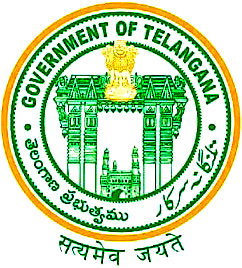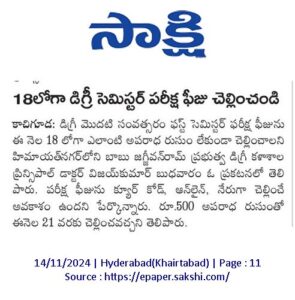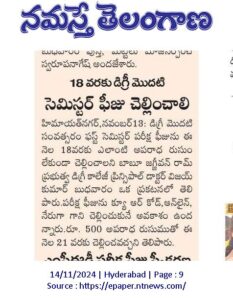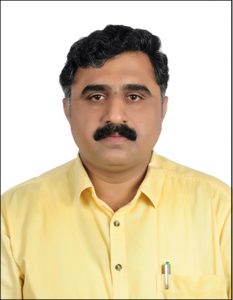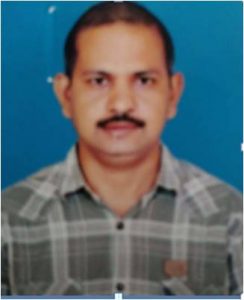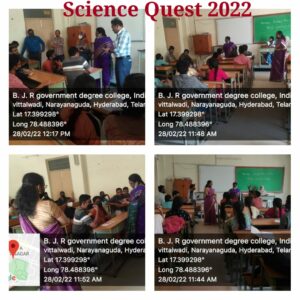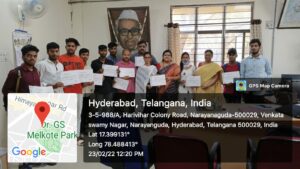Dept. of Mathematics
- About
- Courses Offered
- Faculty
- Curricular & Co-Curricular
- Research, Extension & MoUs
- Results
- Activities
- Best Practices
- Future Plans
About Us
The Department of Mathematics was established at Babu Jagjivan Ram Government Degree College, Hyderabad, during the academic year 1974 as a major subject in the B.Sc Program. The very first program B.Sc. (Mathematics, Physics and Chemistry) with both medium of instruction. The department has introduced with B.Sc (Mathematics, Physics and Computer Science) and B.Sc. (Mathematics, Statistics and Computer Science), with an intake of 30 students in each combination. The student sanction strength is increased to 120 No.s for B.Sc (Mathematics, Physics and Computer Science) and B.Sc (Mathematics, Statistics and Computer Science) during the academic year 2018-19. During the academic year 2020-21, the department is introduced with B.Sc. (Mathematics, Statistics and Data Science) with a sanction of 60 students. The newly introduced bucket system during student admissions (DOST 2021), choosing student interested choice of subject combinations has resulted in the introduction of novel combinations namely B.Sc (Mathematics, Chemistry and Computer Science) and B.Sc (Mathematics, Economics, and Computer Science).
Vision and Mission
To create the most conducive environment for quality academic and research oriented undergraduate and postgraduate education in mathematical science and prepare the students for becoming mathematicians towards becoming as a self-reliant.
The mission of the mathematics department is to prepare students to be research and development leaders in applied sciences. To this end, the programs offered by the department acts as a catalyst and resources for shaping the future of the broad discipline of applied sciences.
Objectives
- To teach students how to apply the principles of mathematics and scientific investigation to solve real-world problems appropriate to the discipline.
- To teach students lifelong learning skills, which will allow them to successfully adapt to evolving sciences throughout their professional careers.
- To prepare students for employment and advanced studies, and provide them with significant experiences in complex mathematical studies for real-world problems.
Programs/Courses Offered
| S. No | Course |
| B.Sc | |
| 1 | B.Sc (Mathematics, Physics, Computer Science) |
| 2 | B.Sc (Mathematics, Statistics, Computer Science) |
| 3 | B.Sc (Mathematics, Statistics, Data Science) |
| 4 | B.Sc (Mathematics, Economics, Computer Science) |
| 8 | B.Sc (Mathematics, Chemistry, Computer Science) |
| 9 | B.Sc (Mathematics, Physics, Chemistry) |
Course Outcomes
| SNo. | Course | Course Outcome(s) |
| 1 | B.Sc. (MPCs.)
Mathematics, Physics, Computer Science |
The Option of the B.Sc. MPCs degree drives the student towards core basic concepts of physical and mathematical sciences along with their interdisciplinary fields. Objectives of this program include:
· Becoming competent in the fundamental streams of physical sciences at under graduate level. · The acquired competence can give students enough preparation to pursue higher education at Post graduate level. Students can also choose to opt Professional courses like MCA or MBA in the state of national institutes. · With the subject of Mathematics along with Computer science and Physics, the students could able to deal with critical thinking and problem solving applied to real world computational problems. · Core basic sciences of this Program enable the students to apply their knowledge solving the problems in a scientific way. · Students can also make cross-disciplinary research using this program through analysis and synthesis while applying issues related to social or economic societal issues. · The student who pursued this program can get the ability to work both on diversified teams and work independently as an expert in a scientific or technical domain. · This program gives the student a big leap in his further education as well as career giving heterogeneous opportunities. |
| 2 | B.Sc. (MSCs.)
Mathematics, Statistics, Computer Science |
The Option of the B.Sc. MSCs degree acts as a driving force for the student towards core basic concepts of mathematical sciences, Statistical sciences along with their interdisciplinary fields. Objectives of this program include:
· Becoming competent in the fundamental streams of Statistical Sciences at under graduate level. |
| · The acquired competence can give students enough preparation to pursue higher education at Post graduate level. Students can also choose to opt for Professional courses like MCA or MBA in the state of national institutes.
· With the subject of Mathematics along with Computer Science and Statistics, the students could able to deal with critical thinking and problem solving applied to real world statistical problems. · Core basic sciences of this Program enable the students to apply their statistical and computational knowledge solving the problems in a holistic way. · Students can also make cross-disciplinary research using this program through numerical analysis and optimization techniques to deal with issues related to societal issues. · The student who pursued this program can get the ability to work both on diversified teams and work independently as an expert in a scientific or technical domain. · This program gives the student a big leap in his further education as well as career giving heterogeneous opportunities. |
||
| 3 | B.Sc. (MSDS)
Mathematics, Statistics, Data Science |
The Option of the B.Sc. MSDs degree is paradigm shift to enter into the areas of machine learning, artificial intelligence, natural language processing, robotics and other interdisciplinary fields. Objectives of this program include:
· Becoming competent in the fundamental streams of Data Sciences, Mathematical Sciences and Statistical Sciences at under graduate level. · The acquired competence can give students enough preparation to pursue higher education at Post graduate level. Students could be able for advanced PG Professional courses like Machine Learning, Artificial Intelligence, Soft Computing, Natural Language Processing and Data Sciences in the state, national and international institutes. · With the subject of Data Science along with Mathematics and Statistics, the students could able to deal with critical thinking and problem solving applied to real world big data problems. · Core basic sciences of this Program enable the students to apply their statistical and computational knowledge solving the problems in a holistic way. · Students can also make cross-disciplinary research using this program through numerical analysis and optimization techniques to deal with issues related to societal issues. · The student who pursued this program can get the ability to work both on diversified teams and work independently as an expert in a scientific or technical domain. · This program gives the student a big leap in his further education as well as career giving heterogeneous opportunities. |
| 4 | B.Sc. (MCCS)
Mathematics, Chemistry, Computer Science |
The Undergraduate program B.Sc. MCCs is a new direction for science degree. Objectives of this program include:
· Becoming competent in the fundamental streams of physical sciences at under graduate level. · Understanding the chemical properties of matter useful for societal life. · This program enables the students to apply their knowledge solving the problems in a scientific way. · Students can also make Inter-disciplinary research using this program through analysis and synthesis while applying issues related to social or economic societal issues. · The acquired competence can give students enough preparation to pursue higher education at Post graduate level. Students can also choose to opt for Professional courses like MCA or MBA in the state of national institutes. · With the subject of Computer Science along with Mathematics and Chemistry, the students could able to deal with critical thinking and problem solving applied to real world problems associated with physical sciences. · The student who pursued this program can get the ability to work both on diversified teams and work independently as an expert in a scientific or technical domain. · This program gives the student a big leap in his further education as well as career giving heterogeneous opportunities. |
| 5 | B.Sc. (MECS)
Mathematics, Economics, Computer Science |
The Undergraduate program B.Sc. MECs is another new amalgamation of arts and science degree. Objectives of this program include:
· The subject Economics gives widened perception of National and International economic aspects to the student. · This program enables the students to apply their knowledge solving the problems in a scientific way. · Students can also make Inter-disciplinary research using this program through analysis and synthesis while applying issues related to social or economic societal issues. · With the subject of Mathematics along with Computer Science and Economics, the students could able to deal with critical thinking and problem solving applied to real world problems associated with physical sciences. · The student who pursued this program can get the ability to work both on diversified teams and work independently as an expert in a scientific or technical domain. · This program gives the student a big leap in his further education as well as career giving heterogeneous opportunities. |
Certificate Courses
| SNo. | Course Name | Collaboration | Academic Year | No. of Students | Coordinator |
| 1 | Geogebra | Spoken Tutorial, IIT Bombay | 2021-2022 | 7 No.s | Dr. P. Rami Reddy, Assistant Professor of Mathematics |
| 2 | Latex | Spoken Tutorial, IIT Bombay | 2021-2022 | 14 No.s |
Workshops, Seminars and Trainings (Attended
Mr. P. Satyanaranaya Reddy
- UGC-HRDC-RUSA FIP course on ICT Tools in Higher Education from August 12-19, 2020 organised by UGC-HRDC, Osmania University.
- Attended FDP on Advanced Concepts for Developing MOOCS from 2nd July 2020 to 17th July 2020, TLC Ramanjunan College, University of Delhi.
- Attended Interdisciplinary Refresher course on Managing Online Classes and Co-Creating 5.0, 11th May 2021 to 25th May 2021.
Dr. P. RamiReddy
- National Conference on Recent Advances of Mathematical Techniques in Science and Engineering during July 30-31, 2017 organised by Dept. of Mathematics, Osmania University.
- Faculty Development Programme on “Optimization Techniques in Artificial Intelligence” organised by Department of Mathematics, Aurora’s Degree & PG College held on August 19,2017.
- Refresh Course in Mathematics from July 4-24, 2018 organised by UGC-HRDC,University of Hyderabad.
- One day seminar on “Mathematics and its Applications” organized by Telugu Akademi on the occasion of its Golden Jubilee Celebrations held on 04-08-2018.
- Two Day State Level Mathematics Meet ENRICH MATHS organized by Dept. of Mathematics, Sarojini Naidu Vanita Maha Vidyalaya held on September 27-28, 2018.
- National Seminar on “Recent Trends in Mathematical Analysis and Mathematical Modelling” on April 27, 2019 organised by Department of Mathematics P. G. Center, A. V. College, Hyd.
- Participated as Teacher Mentor in “Jignasa-Student Projects-State Level Presentation and selection in the subject Mathematics ” for the academic year 2019-20.
- International Conference on Mathematical Science and Applications (ICMSA-2019) during 9-11, 2019 organised by Dept. of Mathematics, GITAM University and presented a paper “ Classification of Solutions of Second order Non-homogeneous Neutral Delay Dynamic Equations on Time scales’’.
- Two Weeks National Level Online Faculty Development Program(FDP) in “Skill Development and Competency Enhancement for College Teachers ” from June 17-30, 2020 organised by Govt. Degree College, Parkal, Warangal Rural.
- National workshop on “Basic Statistics” organized by BJR Govt. Degree College, Narayanaguda, Telangana, India from July 12-15, 2020.
- National Level one week online faculty employment programme on Pure & Applied Mathematics from August 7-13, 2020, Organized by Dept. of Mathematics, SRR Govt. Arts & Science College, Karimnagar.
- UGC-HRDC-RUSA FIP course on ICT Tools in Higher Education from August 12-19, 2020 organised by UGC-HRDC, Osmania University.
- UGC-HRDC-RUSA one week online short term course on “MATLAB Applications for Applied Science and Engineering Problems” from October 12-19, 2020 organised by UGC-HRDC, Jawaharlal Nehru Technological University, Hyderabad.
- One month live online training on MATLAB and LATEX during 26.10.2020 to 29.11.2020 organised by AACHARYA.
- One week Faculty Development Programme on “Research Methodology” from 23-10-2021 to 06-10-2021 organised by Teaching Learning Center, Ramanujan College, University of Delhi.
Extension Lectures (Webinars Arranged)
- An Extension Lecture on Properties of Groups, 29.12.2021, Resource Person: Dr. Srinivasa Reddy, Government City College, Hyderabad.
- A webinar has been organized by the department of mathematics, “Number Theory and its Applications”, 2019-20, Resource person: Dr. Srinivas, University College of Science, Saifabad.
- An Extension lecture on Extreme Value of Function of Two Variable, 16.08.2018. Resource Person: Dr. D. Malleshwari, Assistant Professor of Mathematics, SVS Government Degree College, Hyderabad.
Student Study Projects.
| S. No | Topic | Name | Class |
| 1 | Types of Infinite Series | A Swetha,
B Likitha, C Praveena, D Sai Srikanth E Bharath |
III B.Sc MPCs |
| 2 | History of Mathematics | D Sesha Kumar
P Anusha S Gangadhar
|
II B.Sc MPCs |
| 3 | Group Theory and Applications | Dibyank Pandey
K Pranitha D Poojitha |
II B.Sc MPC and MPS |
Field Trips
| SNo. | Name of the Organization | Date of Visit | Students |
| 1 | Department of Mathematics and Statistics, Osmania University, Hyderabad | 17.08.2021 | II and III B.Sc MSCs and MSDs (25No.s) |
Research and Publications
- Panigrahi and P. Rami Reddy, On oscillatory and asymptotic behavior of fourth order non-linear neutral delay dynamic equations, Comput. Math. Appl. 62 (2011), 4258 – 4271.
- Panigrahi and P. Rami Reddy, Oscillatory and asymptotic behavior of fourth order non-linear neutral delay dynamic equations, Dynamics of Continuous, Discrete and Impulsive System Series A: Mathematical Analysis 20 (2013), 143 – 163.
- Panigrahi, John R. Graef and P. Rami Reddy, Oscillation results for fourth order nonlinear neutral dynamic equations, Commun. Math. Anal 15 (2013), 11-28.
- John R. Graef, S. Panigrahi, and P. Rami Reddy, On oscillatory and asymptotic behavior of fourth order nonlinear neutral delay dynamic equations with positive and negative coefficients, Slovaca. 64 (2014), 347 – 366.(Citations-18 as per 25.03.2022)
- K. Tripathy, S. Panigrahi, and P. Rami Reddy, Oscillation of a class of fourth order functional dynamic equations, Functional Differential Equations, Vol. 21 (2014), No 1-2, pp. 91-108.
- K. Tripathy, S. Panigrahi, and P. Rami Reddy, Oscillation of a class of fourth order functional dynamic equations, Functional Differential Equations, Vol. 22 (2015), No 1-2, pp. 69-91.
- Rami Reddy, N. Sikender and M. Venkata Krishna, Classification of solutions of second order neutral delay dynamic equations on time scales, IOSR Journal of Mathematics (IOSR-JM), e-ISSN: 2278-5728, P-ISSN: 2319-765X Vol. 12, Issue 5 Ver. I (Sep. – Oct. 2016), PP 72-81.
- Sikender, M. Venkata Krishna and P. Rami Reddy, Classification of solutions of second order nonlinear neutral delay dynamic equations with positive and negative coefficients, International Journal of Mathematics Trends and Technology (IJMTT) – Volume 37 Number 1-20, September 2016.
- Sikender, P. Rami Reddy, M. Venkata Krishna and M. Chenna Krishna Reddy, Classifications of solutions of second order nonlinear neutral delay dynamic equations of mixed type, International Journal of Mathematical Archive 9(2), (2018), 284-294.
- Panigrahi, and P. Rami Reddy, Oscillatory behavior of higher order nonlinear homogeneous neutral delay dynamic equation with positive and negative coefficients, J. Appl. Anal. (2018) 24 (2): 24 (2) 139 – 154.
- Panigrahi and R. Reddy, Oscillatory behavior of higher order neutral delay dynamic equations with positive and negative coefficients-I, Functional Differential Equations, Volume 26, No. 1-2, 2019, pp. 75-108.
- Sikender, P. Rami Reddy, M. Chenna Krishna Reddy and S. V. Sailaja, Classification of solutions of non homogeneous non linear second order neutral delay dynamic equations with positive and negative coefficients, Applications and Applied Mathematics, No. 4 (March 2019). Pp. 135-149.
- Rami Reddy, N. Sikender, and M. Chenna Krishna Reddy, Classification of solutions of second order non homogeneous neutral delay delay dynamic equations on time scales, AIP Conference Proceeding 2246, 020056 (2020), published on 28 July 2020.
- Sikender, P. Rami Reddy and P. S. N. Reddy, Classification of solutions of second order non linear non homogeneous neutral mixed delay dynamic equations, AIP Conference Proceeding 2246, 020060 (2020), published on 28 July 2020.
- Rami Reddy, Oscillation results of fourth order non linear neutral delay dynamic equations with quasi derivatives, Journal of emerging technologies and innovative research (JETIR) (ISSN – 2349-5162) Vol. 8, Issue 6, June 2021.
Book Publications
- P. Rami Reddy, Dr. P. Lalitha, Dr. K. Vijayalakshmi, vector calculus Mathematics Text book published by Telugu Akademi, 2019-2020.
- P. Satyanarayana Reddy, Differential Equations, A Textbook of Mathematics, Kedarnath Publications, 2019-2020, ISBN: 81-9427-668-3.
Extension or Community Work
| SNo. | Name of the Teacher | Extension Work |
| 1 | Dr. P. Rami Reddy, Assistant Professor of Mathematics | Faculty members of the department of mathematics have visited to Guru Nanak High School (A Sikh Minority High School), Narayanguda and delivered a talk for school students (08 March 2022). Topics Covered are
· Introduction to Number Systems. |
Result Analysis
Sep/Oct 2021
| SNo. | Course | Appeared | Passed | % |
| 1 | B.Sc (Math., Phy., Chem.) | 41 | 31 | 75% |
| 2 | B.Sc (Math., Stat. Comp. Sc.) | 92 | 74 | 80% |
| 3 | B.Sc (Math., Phy., Comp. Sc.) | 94 | 67 | 71% |
Science Day Fest 2022 at BJRGDC
March 9, 2022On 20.02.2022, the departments of sciences have organized various events on the occasion of National Science Day. Students have actively participated during the celebrations.
Read MoreSuccessful completion of Geogebra Certificate Course from Spoken Tutorials
February 25, 2022On 22.02.2022, the department of mathematics has successfully completed a certificate course "Geogebra" with the collaboration of Spoken Tutorials, IIT Bombay, Hyderabad. A total of 23 students from B.Sc…
Read MoreBest Practices
- Observing Ramanujan Day and Organize activities in related towards building up the student self-reliance.
- Development of Mathematical Models by the students
Future Plans
- To ensure every student of the department should be molded scientifically confident and suitable for the building of the nation.
- The department is planned to organize certificate courses namely Matlab, Scilab, Graphic Calculators, Geogebra, latex for student community through FOSS/MOOCS platforms.
At BJR Govt. Degree College, Narayanaguda, We are happy providing excellent education and molding the future generation ..
For more information and admission details ..

